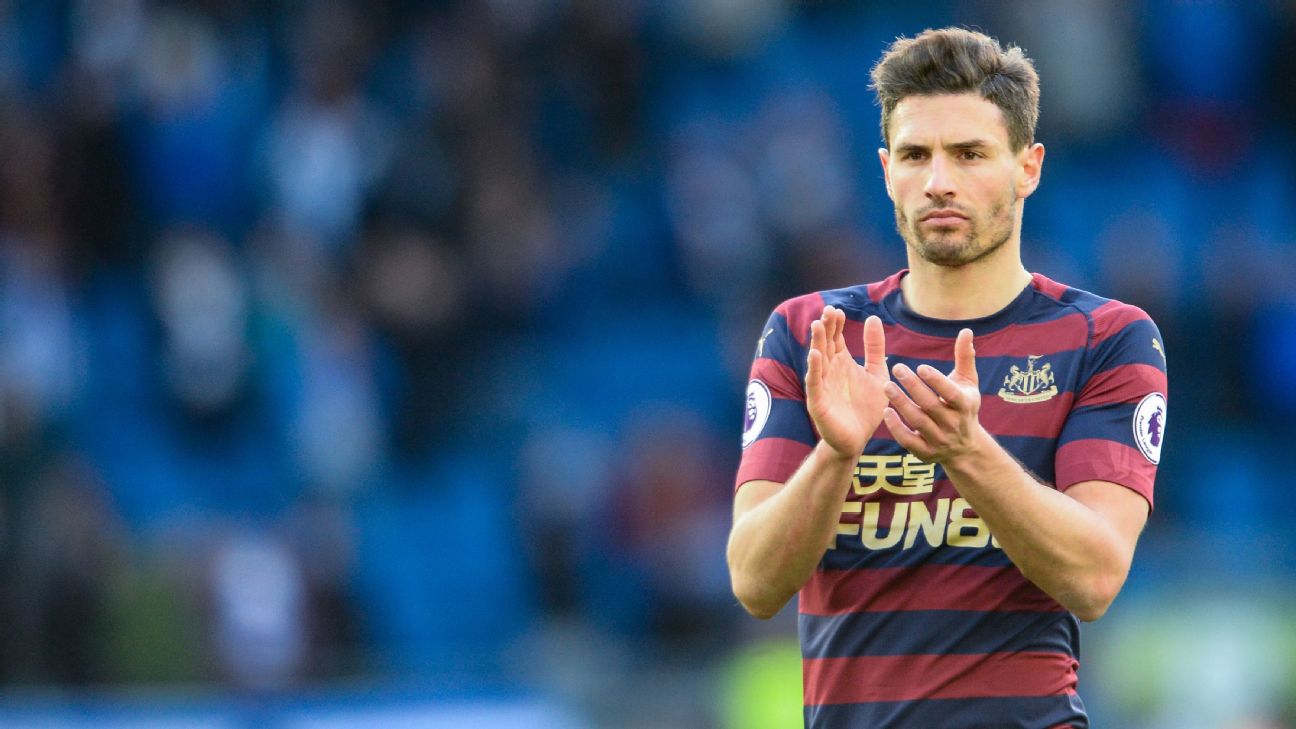It was arguably the best Premier League season in history. The battle between Liverpool and Manchester City came down to the final Sunday of the campaign and required City to win their final 14 games of the season to hold on to their one-point lead and retain their crown. Liverpool finished second with the third-highest point total in Premier League history, while City held on for dear life and survived with one of the most impressive stretch runs you’ll ever see.
Jurgen Klopp & Co. won’t be too heartbroken if they win the Champions League on June 1, of course, but let’s cheer them and the rest of the league by handing out arbitrary awards. Back in December, I went around the Premier League and gave out superlatives for everything from best substitute to most tired managerial storyline.
Let’s go back to the well and hand out awards for the full season. I’ve narrowed down the categories a bit, but with a full season of data to work with, I’ve expanded the results from three selections to five. Where applicable, I’ve used advanced metrics and expected goals (xG) data prepared by ESPN Stats & Information. Transfer values are the prices listed at Transfermarkt.
Jump to: Best signing | Worst signing | Goal of the season | Save of the season | Young newcomer of the season | Team of the season | Player of the season
Best signing of the season
Let’s start by running through the top signings of the past season, covering both the summer 2018 and winter 2019 transfer windows. These are weighted for positional scarcity — basically, finding a striker for £10 million is more valuable than paying the same price for a wing back — and cost. The players who belong on this list are the ones who have had their transfer value rise the most over the past 12 months, factors that contribute to keeping stars such as Felipe Anderson and Richarlison, as well as valuable veterans like Lukasz Fabianski, off this list.
5. David Brooks, Sheffield United to Bournemouth, £10.2m
It’s rare for a player to move from a lower league to the Premier League after one season of senior football. It’s even more unusual to make a big move after just nine starts at the Championship level, as Brooks did last summer. This was a hugely risky investment for manager Eddie Howe, but it paid off. Brooks was a creative force for the Cherries, producing seven goals and five assists in 2,276 minutes. The 21-year-old also barely seemed to tire as the season went along, which was promising given his slight frame and lack of experience. Bournemouth recognized Brooks’ impact by signing him to a new contract in March.
4. James Maddison, Norwich City to Leicester, £22.5m
Leicester managed to overcome losing Riyad Mahrez to Manchester City by signing an even more creative player to replace the Algerian star. Maddison isn’t the same sort of player, of course, but the Coventry City product created a league-high 100 chances for his teammates this season. Jamie Vardy finished fourth in the Premier League in xG during the second half of the season and Maddison — who racked up 4.6 xG and 4.2 xA over that timeframe — was the biggest reason. Given the inflated price of English talent on the market, Maddison could very well fetch twice this price if Leicester decided to sell him this offseason. He’s more likely to be the focal point of the post-Mahrez side for years to come.
3. Lucas Torreira, Sampdoria to Arsenal, £27m
Torreira’s numbers don’t necessarily stand out in a similar way to Brooks’ or Maddison’s, but given how long Arsenal had been crying out for a defensive midfielder with some meaningful bite, it’s no surprise Torreira has become hugely popular with Arsenal fans. Tackle numbers for teams with as much possession as Arsenal can be skewed, but Torreira ranks in the top 20 in ball recoveries and opponent-adjusted tackles among regular starters. He’s also a more thoughtful player in possession than most players of his ilk. Torreira’s numbers declined over the course of the season, which is why he fell from the top spot at midseason to third, but he’s a building block for Arsenal.
2. Ricardo Pereira, Porto to Leicester City, £19.8m
The other key signing from Leicester’s offseason, Pereira recently took home Player of the Season and Players’ Player of the Season honors at the club awards for an outstanding debut campaign in England. Employed as both a traditional right-back and occasionally a right-winger under Claude Puel, Pereira chipped in with six assists while also contributing 117 tackles, the latter of which was second in the league among full-backs. Among Pereira’s two goals, of course, was a wonder strike against Manchester City on Boxing Day. Pereira’s not Mahrez, but he was an enormous upgrade on Danny Simpson at right-back and one of the best full-backs in the division.
1. Fabian Schar, Deportivo to Newcastle, £3.6m
When you rarely get to spend money, you need to make your few deals count. Rafa Benitez pulled that off yet again at Newcastle this offseason. Although Miguel Almiron was arguably the signing of the winter window before going down with a hamstring injury, I consider Schar the signing of the summer given the absurdly low price. Newcastle benefited when a relegation clause in the Swiss defender’s deal knocked down Schar’s value, but every other club could have made this move, too.
All that Newcastle have come away with is one of the most impactful defenders of the Premier League season. Schar has been the difference-maker for the Magpies this season. With him in the lineup, Newcastle has gone 12-7-5, averaging 1.71 points per match and allowing one goal per contest. Without Schar? Newcastle would be relegation bait at 0-10-4, good for an average of 0.3 points per match, while allowing 1.71 goals per contest.
Is it too simplistic to credit all of that difference to Schar? Probably. It also seems clear that he deserves a huge amount of credit for helping to turn Newcastle’s defense around, as the 27-year-old ranks among the league leaders at his position in both interceptions and progressive runs per 90 minutes. Schar also scored four goals, including a world-class strike against Burnley that narrowly missed out on a place in my Goal of the Season superlatives.
Worst signing of the season
Likewise, it’s time to judge the most disappointing transfers of the past season, too. I’ll throw in age as a factor here: Although players like Yerry Mina and Caglar Söyüncü commanded significant fees and didn’t make an impact in their first seasons in England, they’re still young enough to turn good on their clubs’ investment. In an era where players on the wrong side of 30 rarely command significant fees, guys in their late 20s need to make an immediate impact to justify large expenditures given the relative lack of resale value from their deals.
5. Matej Vydra, Derby to Burnley, £11m
Manager Sean Dyche has a habit of building his attacks around successful goal scorers at the Championship level, having signed Ashley Barnes, Chris Wood and Andre Gray from the second tier in years past. No surprise, then, when Dyche swooped for the 27-year-old Vydra this summer after the Czech international failed to agree personal terms with Leeds.
But Vydra has been a nonfactor. After scoring in September, he failed to hit the back of the net. He started in a 4-2 loss to West Ham on Nov. 13 and played just 68 minutes over the ensuing seven months, most of which came after Burnley’s status in the top flight was confirmed in late April. Burnley will stick around in the Premier League for another season but Vydra might not be along for the ride.
4. Alireza Jahanbakhsh, AZ to Brighton, £17.1m
Brighton narrowly held on to their own Premier League status and scoring was their biggest problem. Chris Hughton’s club scored a mere 35 goals this season, the fewest among the 17 Premier League survivors this season. Just 16 of those goals came from open play, which ranked 19th among the 20 Premier League clubs, ahead of only Huddersfield Town. After 35-year-old Glenn Murray, the club’s second-leading scorer was center-back Shane Duffy with five goals.
Brighton had to be hoping for more from Jahanbakhsh, who was a nonfactor during his first season in English football. That’s almost literally true: in 1,022 minutes, the Iranian winger failed to record a goal or an assist for Brighton. It’s obviously a disappointing return given that the 25-year-old led the Eredivisie with 21 goals in his final season at AZ. Jahanbakhsh did miss two months with a hamstring injury and then went to the Asian Cup upon returning, but at best he has been a peripheral figure even when available. Brighton will expect more from their record purchase next season.
3. Andre-Frank Zambo Anguissa, Marseille to Fulham, £22.4m
Picking the worst transfer from the bunch is difficult given that Jean-Michael Seri contributed all of one goal and three assists in more than 2,000 minutes after signing from Nice, while Alfie Mawson was wildly ineffective at center-back before undergoing knee surgery. Most observers would still give the nod to Anguissa, who’d really shined for only one season at Marseille before moving to London. Signed to play as the defensive midfielder with Seri presumably in an attacking role, it quickly became clear that the two were a subpar fit. Anguissa labored through a disastrous fall and then missed significant time with an ankle injury. While he has improved some upon his return and has been a steady presence in the lineup under Scott Parker, Anguissa simply hasn’t delivered on the promise he showed in France.
2. Ben Gibson, Middlesbrough to Burnley, £15m
It’s difficult to make less of an impact than Gibson has this season. Once called up to the English senior team, he was expected to figure into the starting XI for Burnley this season after a £15 million offseason transfer. Instead, Gibson entered the season with a hernia and ended up playing once, a 63-minute spell on Boxing Day in a 5-1 loss to Everton. The nicest thing you can say is that Gibson at least scored the consolation goal before he was yanked off and sent to the bench for the remainder of the campaign.
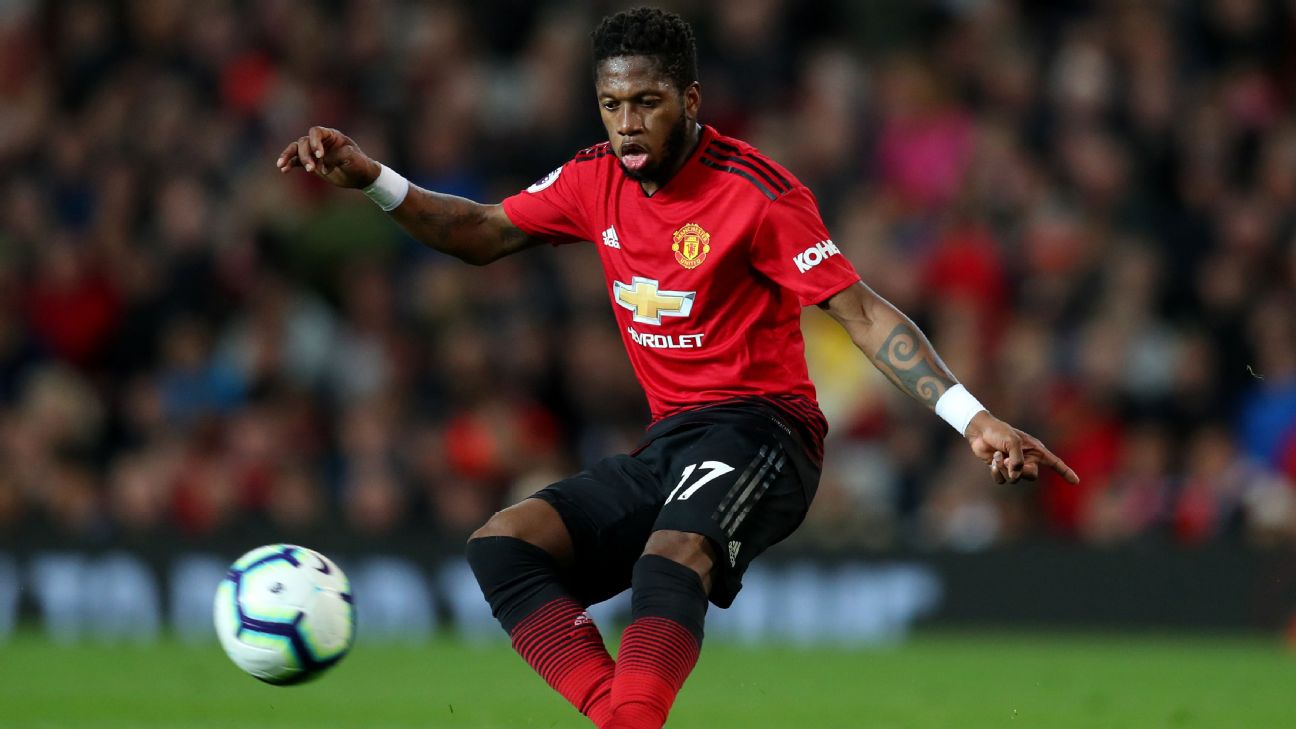
1. Fred, Shakhtar Donetsk to Manchester United, £53.1m
Could it be anyone but Fred? You might argue that the Brazilian has been unfairly scapegoated as the symbol of the bloat that’s enveloped Manchester United in the post-Ferguson era, with the club spending over the odds to sign players their managers subsequently don’t want to pick. Fred wasn’t favored by Jose Mourinho, and while Ole Gunnar Solksjaer gave everyone at the club a fresh start, Fred also wasn’t a significant part of the United winning streak in the league.
The 26-year-old played just 162 Premier League minutes during the 12-game stretch to start Solksjaer’s run, when United took 32 of 36 possible points. While Fred also started in the miraculous comeback win over Paris Saint-Germain in the Champions League, he gave away a penalty in the streak-ending loss to Arsenal and was overrun in the 3-0 loss to Barcelona. Fred came in for criticism from Roy Keane for his effort during United’s loss in the Manchester derby. It’s unclear whether he’ll be part of Manchester United’s next rebuild.
Goal of the season
A great goal is a great goal, but context helps here: an incredible strike that swung two points and helped decide the title race (hint hint) means slightly more than the fourth goal against Huddersfield. Yes, that Vincent Kompany strike against Leicester is on the list, but did the City stalwart’s effort make it to No. 1?
5. Son Heung-Min, Tottenham vs. Chelsea, Nov. 24
It’s hard to believe that Son was once viewed as a disappointment after struggling to make an impact in his first English campaign. It’s difficult to imagine Spurs without the effervescent Korean star at this point, given that the 26-year-old serves as both a valuable winger when Harry Kane is in the lineup and the focal point of the attack when he’s not. Son’s most notable contribution this season was when he scored three goals over two legs to help knock out Manchester City in the Champions League quarterfinals, but Spurs fans won’t soon forget Son clowning Jorginho and David Luiz en route to scoring Tottenham’s third against Chelsea.
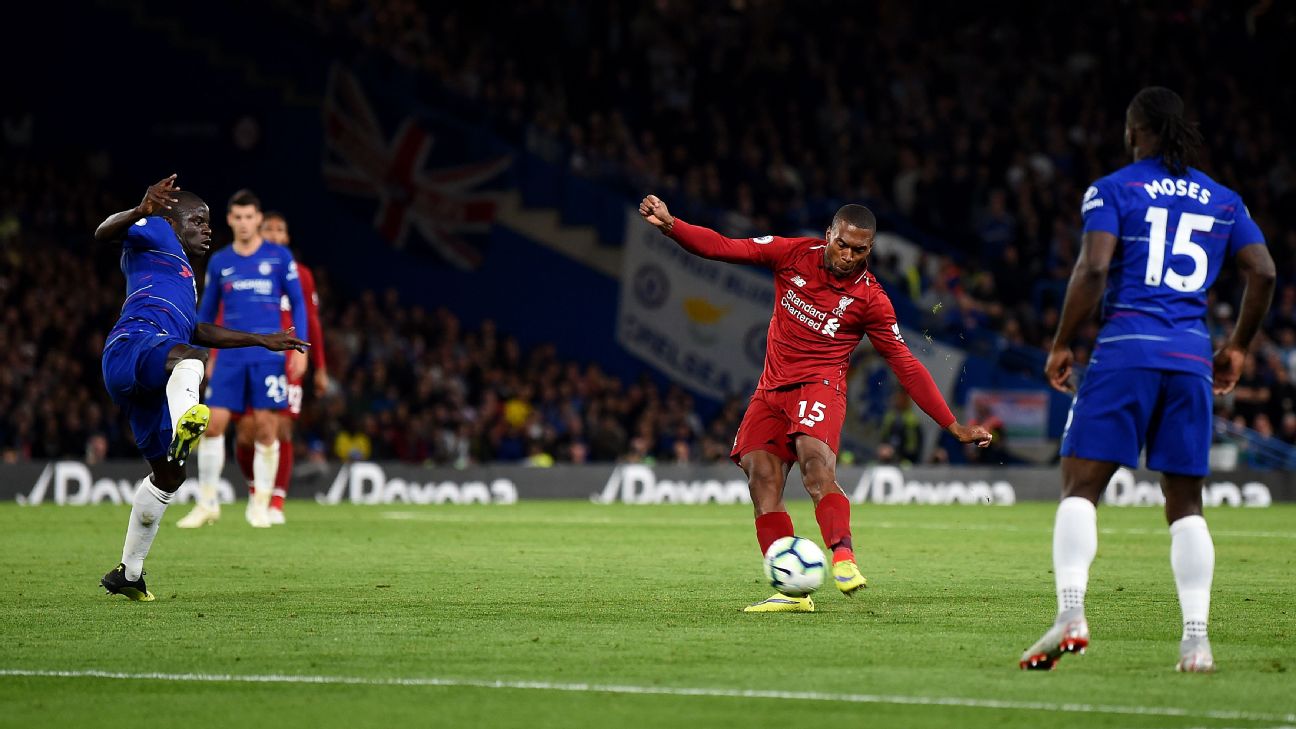
4. Daniel Sturridge, Liverpool vs. Chelsea, Sept. 29
Although Sturridge has been goalless and anonymous since the beginning of October, he helped cover for Mo Salah’s slow start to the season by scoring four times across August and September. In addition to a goal against PSG in the Champions League, Sturridge helped earn a crucial point for Liverpool by curling in a brilliant late equalizer against Chelsea.
3. Eden Hazard, Chelsea vs. West Ham, April 9
There are plenty of brilliant footballers in the Premier League, but I’d dare say nobody else could have scored this goal. Hazard manages to create a dangerous opportunity in the blink of an eye and dribbles through the roadblock West Ham has set at the edge of the box, then perfectly places his finish in the corner. Hazard would score a second later in the match but has failed to score since; it would be fitting if this moment of magic was his last goal in a Chelsea kit.
2. Vincent Kompany, Manchester City vs. Leicester, May 6
The goal that saved the title. We’ll never know whether City would have managed to find an equalizer over the final 20 minutes if their longtime defender hadn’t fired them into the lead, but this would be a suitable goal for deciding any championship race. Kompany’s impact on title races in years past has been more subtle, but again, this would be a suitably significant moment to end Kompany’s Premier League career if the Belgian does leave City. One of the final signings of the Thaksin Shinawatra era before City came under the ownership of the Abu Dhabi royal family in 2008, Kompany has been a massive force in the center of City’s defense, and injury would be the only argument keeping him away from lists of the best defenders in Premier League history.
1. Andros Townsend, Crystal Palace vs. Manchester City, Dec. 22
It didn’t end up deciding the title race after all, but even given the importance of Kompany’s goal, I still think the sheer brilliance of Townsend’s volley into the corner is enough to top this list. Remember how Paul George said that Damian Lillard’s game-winning 3-pointer to seal the Blazers’ series win over the Thunder was a “bad shot”? This was a bad shot. You shouldn’t try this. It had a better chance of going 20 rows into the stands than it did of hitting the back of the net. Townsend did it anyway, and it produced the best goal he’ll ever score.
Save of the season
With this superlative, we’re looking for saves where a keeper had to react at the last moment, deal with a deflection or use every inch of his frame to stop a sure goal. Point-blank saves where a keeper doesn’t know much about what’s happening before the ball finds him are obviously valuable, but style counts here.
5. David de Gea, Manchester United vs. Tottenham, Jan. 13
I almost have to put a De Gea save from this match in the rankings, given that it was probably the single best individual performance from a goalkeeper all season. The longtime United star had a brutal end to the campaign, but United needed each of his 11 saves to secure a 1-0 win at Wembley against Spurs. You can pick your favorite, but I prefer his kick save to deny Harry Kane. (Another kick save that narrowly missed this list was Angus Gunn saving a would-be own goal against Arsenal.)
4. Hugo Lloris, Tottenham vs. West Ham, Oct. 20
Speaking of Spurs and uneven seasons … Lloris went through his own struggles on and off the pitch this season, but his best performance came against the Hammers in October. Among Lloris’ saves in a man of the match performance was this fingertip stop to deny Marko Arnautovic.
3. Kepa Arrizabalaga, Chelsea vs. Fulham, March 3
A lot of keepers in the Premier League had some pretty difficult moments this season, huh? The most memorable moment of Kepa’s debut season in England came when he refused to be substituted during the League Cup final, which led to the £72m keeper losing his place in the team. Seven days after the tempest, Kepa returned and delivered a fine performance against Fulham. Aleksandr Mitrovic has an unreal ability to get power on his shots without needing space or time, but Kepa was up to the task against this volley.
2. Lukasz Fabianski, West Ham vs. Manchester United, Sept. 29
Once known for his gaffes at Arsenal, Fabianski might have been the steadiest keeper in the Premier League all season. This was my midseason pick for save of the half-season and honestly, it still might deserve to be No. 1. It’s a more difficult version of the Lloris save that finished fourth, as the Polish international is forced to react at the last moment, using incredible wrist strength to keep out a Marouane Fellaini header.
1. Jordan Pickford, Everton vs. Huddersfield, Jan. 29
Pickford failed to live up to lofty expectations after impressing during England’s run to the semifinals of the World Cup over the summer, but there’s no denying this is a great save. It usually didn’t take much to keep Huddersfield out of opposing nets this season, but this free Elias Kachunga header was ticketed for the bottom corner, only for Pickford to sprint from one side of his goal to the other to tip the shot away. It ended up saving two points for the Toffees in a 1-0 victory.
Young newcomer of the season
I’m adding this award as a replacement for young player of the year honors, which went to Raheem Sterling. Honestly, Sterling deserves all the hardware we can give him, but it seems silly to give an award to Sterling for young player after he’s already been established as a Premier League star for years. Sterling’s only 24, but that’s not even really a young player anymore. The average outfield player in the Premier League this year on a minute-adjusted basis was 26.8 years old, so let’s shift the criteria for a different sort of award.
To be eligible for the young newcomer award, our candidates have to be 23 or younger at the end of the 2018-19 season. Players who had more than 1,000 minutes of Premier League experience under their belt before the season began are also ineligible, which notably removes Declan Rice from the equation.
5. Diogo Jota, forward, Wolverhampton Wanderers
Part of the Portuguese revolution propelling Wolves into the top 10 this season, Jota was initially signed on loan from Atletico Madrid during Wolves’ successful promotion campaign last year before making a £12.6m permanent switch this offseason. The Porto product scored 17 goals and chipped in five assists in 3,632 minutes at the Championship level last season and he’s nearly kept that scoring rate up at a higher level, with nine goals and five assists in 2,368 Premier League minutes this season. Three of those goals came in a Midlands battle against Leicester, one of just three hat tricks all season from a player who doesn’t represent one of the top six.
4. Lucas Torreira, midfielder, Arsenal
I mentioned Torreira’s exploits earlier in talking about him as a great transfer; the Uruguayan doesn’t turn 24 until next February, so he should be part of the squad Unai Emery will try to build in North London for years to come.
3. James Maddison, midfielder, Leicester City
Likewise, Maddison is both a great transfer and a very promising Premier League debutant. It’s been a remarkable rise for a player who first began to make his name as a teenager in League One before going on loan to Aberdeen. Two years ago, Maddison had barely made any appearances in the Championship. Now he’s on the fringes of the English national team.
2. Ruben Neves, midfielder, Wolverhampton Wanderers
It’s another Portuguese player at Wolves! Like Jota, Neves was along for the ride as Wolves won the Championship last season. He was arguably the best player in the second tier a season ago, which might not seem like a surprise given Neves’ £16 million transfer fee, but perhaps should be given that the fellow Porto product was only 20 years old for most of the campaign.
Neves wasn’t quite as dominant in the top tier, finishing the season with four goals and three assists, but there are few players who do as many things as well as Neves does. The 22-year-old finished eighth in the league with 73 interceptions, but he simultaneously has free kicks like this stunner against Arsenal in his locker. It’s no wonder the Gunners are rumored to be interested in signing Neves as a replacement for Aaron Ramsey.
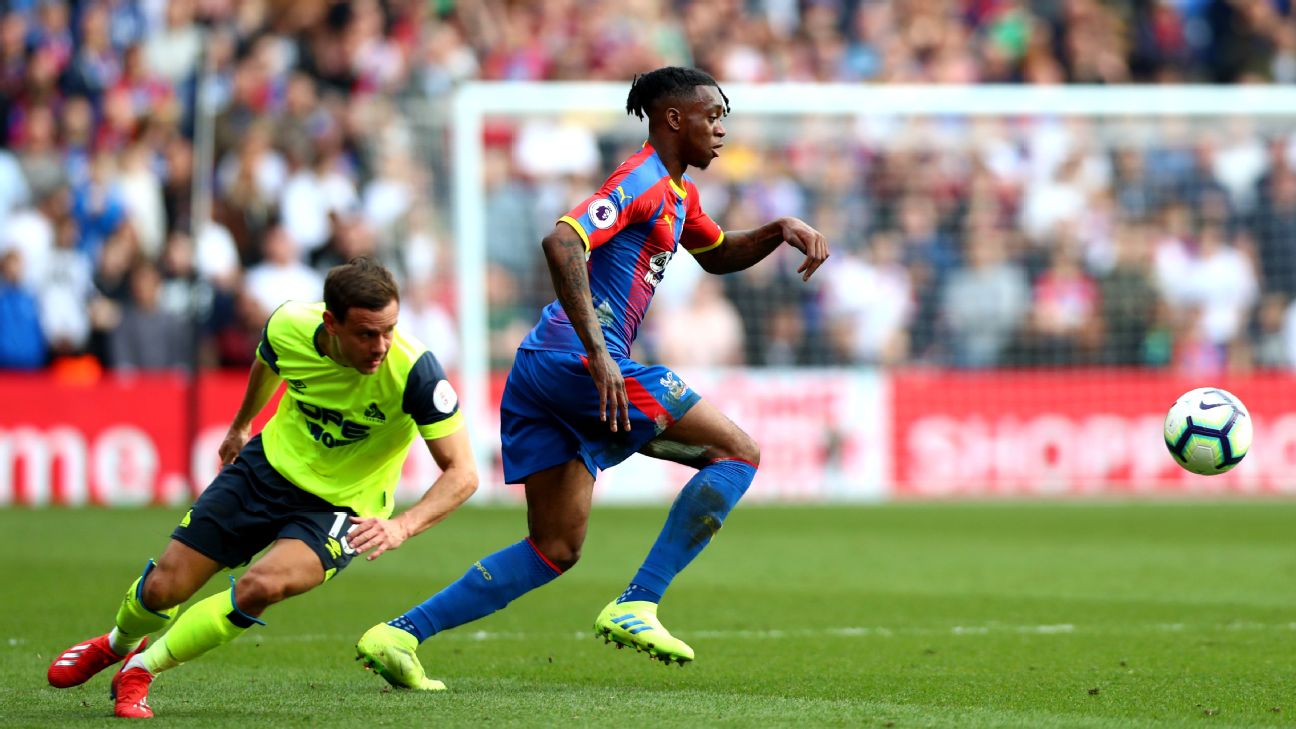
1. Aaron Wan-Bissaka, right back, Crystal Palace
The most stunning breakout of the season belongs to the most successful graduate of Crystal Palace’s academy since Wilfried Zaha. The 21-year-old Wan-Bissaka only peeked into the first team last February, and while he played well enough to justify a spot in Crystal Palace’s senior team this season, nobody could have seen this coming.
AWB had 91 successful tackles this season, second-best in the Premier League behind Wilfried Ndidi and 25 more than any other right-back in the league. The only defender in the league with more than 2,000 minutes played who has topped Wan-Bissaka’s 65.5 percent success rate on tackle attempts is Virgil Van Dijk. The Palace star also finished second in the Prem with 84 interceptions. Wan-Bissaka’s revelation of a campaign is enough to justify pitting him against Trent Alexander-Arnold as England’s right-back of the future. A national team call-up is surely on the way; a move to one of the top six might follow.
Team of the season
I’ll pick a starting 11 out of a 4-2-3-1 formation and seven substitutes to follow. Before I get started, though, I should warn Spurs fans that there aren’t any Tottenham players in the first team. Based on Premier League form alone, there wasn’t a logical spot for one. Kane made my midseason XI and would have likely been this team’s striker before his ankle injury. Players like Christian Eriksen, Moussa Sissoko and Toby Alderweireld all had excellent seasons, but there were clearly more productive players at their respective positions. Son Heung-Min is brilliant, but he narrowly topped 2,000 minutes in the league and has to compete with a handful of world-class wingers.
The only thing that might cheer Spurs fans up — outside of the upcoming match in Madrid — is that Arsenal don’t have a player in the team, either.
GK: Lukasz Fabianski, West Ham
Fabianski over Alisson or Ederson? The 34-year-old certainly didn’t cost as much as the two Brazilians and allowed more goals this season, but Fabianski had far more work to do and played a huge role in West Ham’s rise up the table after a slow start. Fabianski led the league in a variety of categories: overall saves (148), collected saves (58), saves on shots in the box (104) and even fingertip saves (five).
At 73.2 percent, Fabianski had a higher save percentage than Ederson (72.3 percent), who faced less than half of the shots Fabianski had to deal with all season. Alisson was ahead of Fabianski at 78.2 percent, which led the league, but again, the former Roma star had to deal with only about half of the shot volume Fabianski dealt with over the course of the season. Alisson also got to play behind an acclaimed defense on a team that had the second-highest possession percentage in the league, whereas Fabianski’s side took a league-high five red cards, was middle of the pack in possession and didn’t exactly have Van Dijk at center-back.
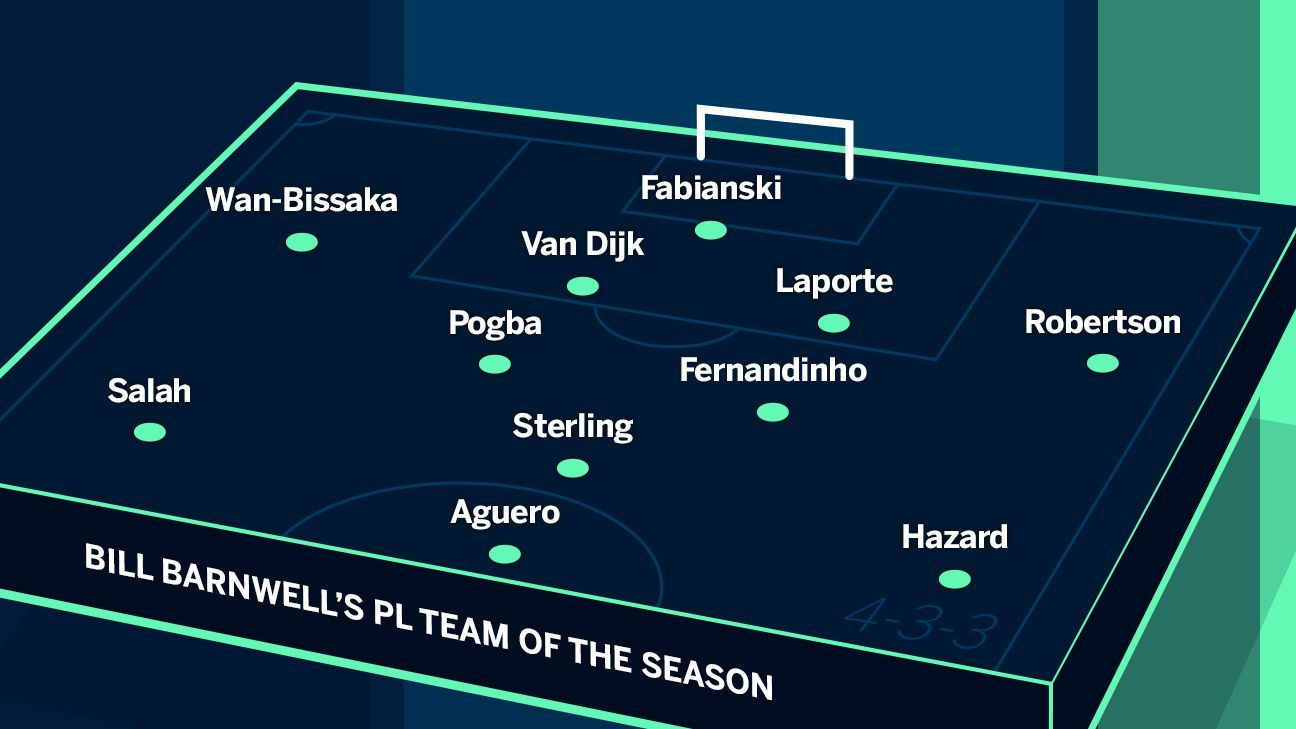
RB: Aaron Wan-Bissaka, Crystal Palace
Alexander-Arnold could figure here — we’re living in a truly gilded age for hyphenated English right-backs — but I’ll lean toward the defensive strength of Wan-Bissaka over the attacking edge Alexander-Arnold offers as a crosser. Again, Wan-Bissaka finished the season second in both successful tackles, interceptions and crosses blocked. Alexander-Arnold’s clearly a more complete player, but it’s incredible for a right-back to be as productive defensively as AWB has been for Palace this season.
CB: Virgil Van Dijk, Liverpool
Duh. More on him in a minute.
CB: Aymeric Laporte, Manchester City
An unmarked Laporte scored what will go down as the title-clinching goal for City during Sunday’s 4-1 win at Brighton, and while it will unquestionably be lost to history in comparison to Kompany’s goal against Leicester, Laporte has been an absolute rock for a defense that finished only one goal behind Van Dijk’s Liverpool side. There’s a gap between Van Dijk and the other center-back candidates around the league, but Laporte scored three times and was the ever-present center-back on a team that allowed only 23 goals all season, one off Liverpool’s pace.
LB: Andrew Robertson, Liverpool
There were five players in this team who were easy selections, and while Lucas Digne impressed in his debut season one mile north for Everton, Robertson was one of those five. The Scot, who started his professional career just seven years ago in the lofty heights of the Scottish third division with Queen’s Park, has stunningly matured into one of the best left-backs on the planet since moving to Liverpool. No left-back in the league recovered the ball or successfully completed tackles more frequently than the 25-year-old, and the only defender to rack up more assists than Robertson’s 11 was his teammate, Alexander-Arnold.
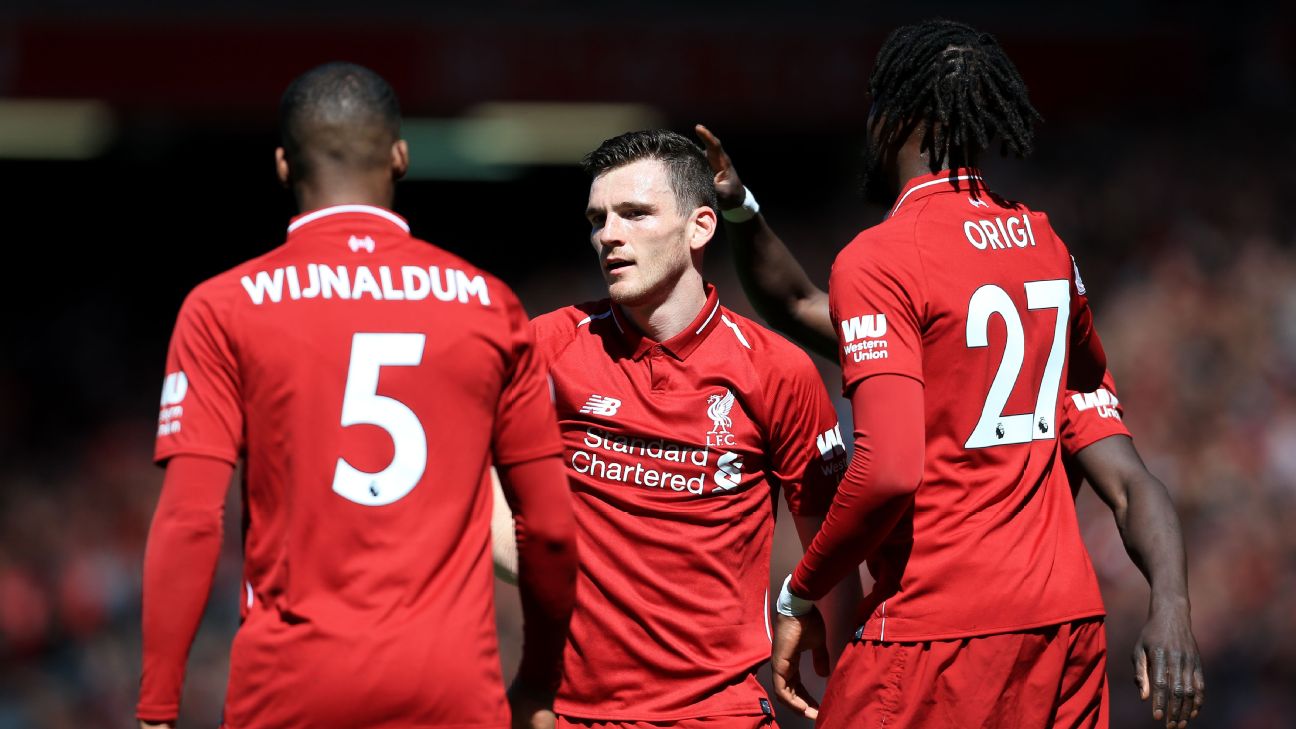
CM: Fernandinho, Manchester City
Fernandinho is not City’s best player, but is there anybody Pep Guardiola would miss more if he weren’t available? The Brazilian played 29 matches this season and in those contests City went 25-2-2 while allowing just 15 goals. City lost twice during Fernandinho’s nine absences and allowed eight goals across those nine contests. The 34-year-old ranked 13th in the league in adjusted tackle rate and 19th in adjusted interception rate among players with 2,000 minutes or more and chipped in with six through balls. He even added a beautifully targeted goal on a 0.05 xG attempt against Burnley. He remains essential to City, even at an age when other stars at his position would typically be moving into part-time roles.
CM Paul Pogba, Manchester United
Picking someone like Fabianski might be controversial in one way; adding Pogba is controversial in another. Pogba’s a perennial flashpoint and seemingly the cause of some portion of United’s problems at all times. The World Cup winner spent the first half of the season seemingly sulking under the fading regime of Mourinho, and while he seemed to shine once Solksjaer took over, Pogba’s displays toward the end of the season — most notably against Everton — attracted criticism from Roy Keane.
If Keane wants to parse Pogba’s body language and hold him up to his own lofty standards, that’s fine. Here’s what we know about Pogba: he’s critical to United’s chances of winning. He scored 13 goals this season, and while seven of them were on penalties, Pogba also created 50 chances for his teammates, which was behind only Bernardo and David Silva among central midfielders. The Frenchman created nine assists on just 4.86 xA, which owes some to his impressive range as a passer. His 21 expected goals and assists were 10th-most in the Premier League and most for any central midfielder.
Has Pogba lived up to his £89m transfer fee? I’m not sure. Are there moments where he doesn’t track back the way a former player would want? Probably. Would United be better off without the 26-year-old in their team? Absolutely not. He won United points on his own this season, with this interception and sublime pass to set up Marcus Rashford for the game’s only goal against Leicester as an example.
Selling Pogba would be a step backward for United.
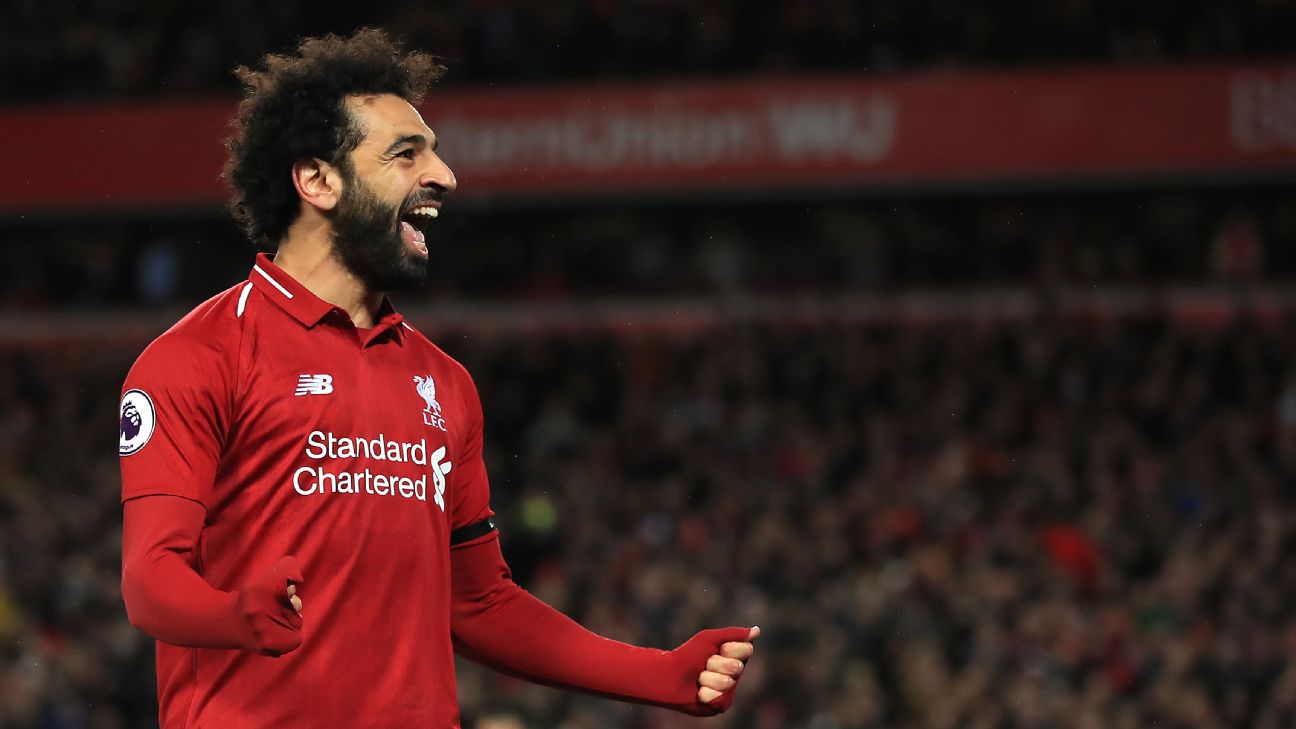
RW: Mohamed Salah, Liverpool
Salah wasn’t shortlisted for the PFA Player of the Year award after winning it last season, but that’s a mistake and likely a product of an unrealistic baseline. It was always unlikely Salah was going to top 30 goals in consecutive seasons, given that his 32 goals came against a baseline of 25.3 expected goals last campaign. He scored “only” 22 goals this season, but by creating more scoring chances and staying healthy for a full 38-game campaign, Salah was still the most productive attacking player in the Premier League by a comfortable margin for the second consecutive campaign.
He finished the season by producing 31.7 combined expected goals and assists; Pierre-Emerick Aubameyang was second with 29.1 combined xG+xA, and then nobody else in the league topped Raheem Sterling’s mark of 25.3. Salah wasn’t as good as he was last season, but he was still arguably the best forward in the league.
AM: Raheem Sterling, Manchester City
After years of underperforming his xG marks and gaining an undeserved reputation as a poor finisher, Sterling finally managed to produce 17 goals against 14.8 expected goals this season. No attacker in the league who attempted 50 or more unblocked shots managed to put a higher percentage of those shots on target than Sterling. It wasn’t all about finishing, either: Sterling created 64 chances from open play, the third most in the Premier League. The 24-year-old also deserves plaudits for his role in publicly combating racism, both inside stadiums and within the media. He’s essential for club, country and the league itself.
LW: Eden Hazard, Chelsea
Moving back inside from the left to accommodate Sterling and Salah on the wings is Hazard, who might have been the only thing keeping Chelsea in the top six this season, let alone third. The Belgian star finished the season with 31 combined goals and assists, the most of any player in the Premier League. He created a league-high 75 chances from open play, nine more than any other player. In a “Sarriball” attack that seemed to devolve into self-parody during the winter, Hazard was Chelsea’s “get out of jail free” card. This is a club that managed to get only 12 goals out of 2,777 minutes from the trio of Gonzalo Higuain, Alvaro Morata and Olivier Giroud at striker throughout the season.
Sarri needed Hazard to carry this team, and he did enough to propel Chelsea into third place and a Champions League berth. That’s significant guaranteed income for a club that is about to enter a two-window transfer ban and is essentially in a holding pattern until next summer. Hazard seems likely to follow Thibaut Courtois to Madrid, but he’ll be leaving after his most productive — and in its own way, most important — season in a Chelsea kit.
ST: Sergio Aguero, Manchester City
As is the case with Salah, we might be setting our baseline expectations for the legendary Argentinian too high: 21 goals would be a record season for most Premier League strikers but it’s just another season for Kun, who finished his fifth consecutive 20-goal campaign with the equalizer in Sunday’s title decider against Brighton. It wasn’t quite as impressive of a strike rate as last season, when Aguero scored 21 goals in just 25 matches, but 21 goals in 33 appearances should be impressive by anyone’s standards.
Aubameyang would also have a right to sneak in here given that he finished second in both goals and expected combined goals plus assists, but the Arsenal star scored 16 goals from open play to Aguero’s 18, with the latter figure topped only by Sadio Mane. Aguero also added eight assists, topping both Auba (eight) and Mane (one).
Substitutes
GK Alisson, Liverpool; LB Lucas Digne, Everton; CB Shane Duffy, Brighton; CM Bernardo Silva, Manchester City; CM Christian Eriksen, Tottenham; FW Sadio Mane, Liverpool; ST Pierre-Emerick Aubameyang, Arsenal
Player of the season
Let’s finish by picking the best player of the campaign. In my eyes, there are four viable candidates for the award, and if you ordered that top four in any way, I wouldn’t fault you. (I understand you might not offer me the same courtesy.) As you might suspect given the final table, four of the five candidates come from the top two clubs.
5. Sergio Aguero, Manchester City
I would argue that Aguero narrowly misses out on that top foursome in part because he didn’t play quite as much; he finished the season with 2,479 Premier League minutes under his belt whereas the four other players in this top five were on the pitch between 2,776 and 3,385 minutes each. City were understandably comfortable giving minutes to Gabriel Jesus at striker, but that costs Aguero in terms of a discussion about individual value.
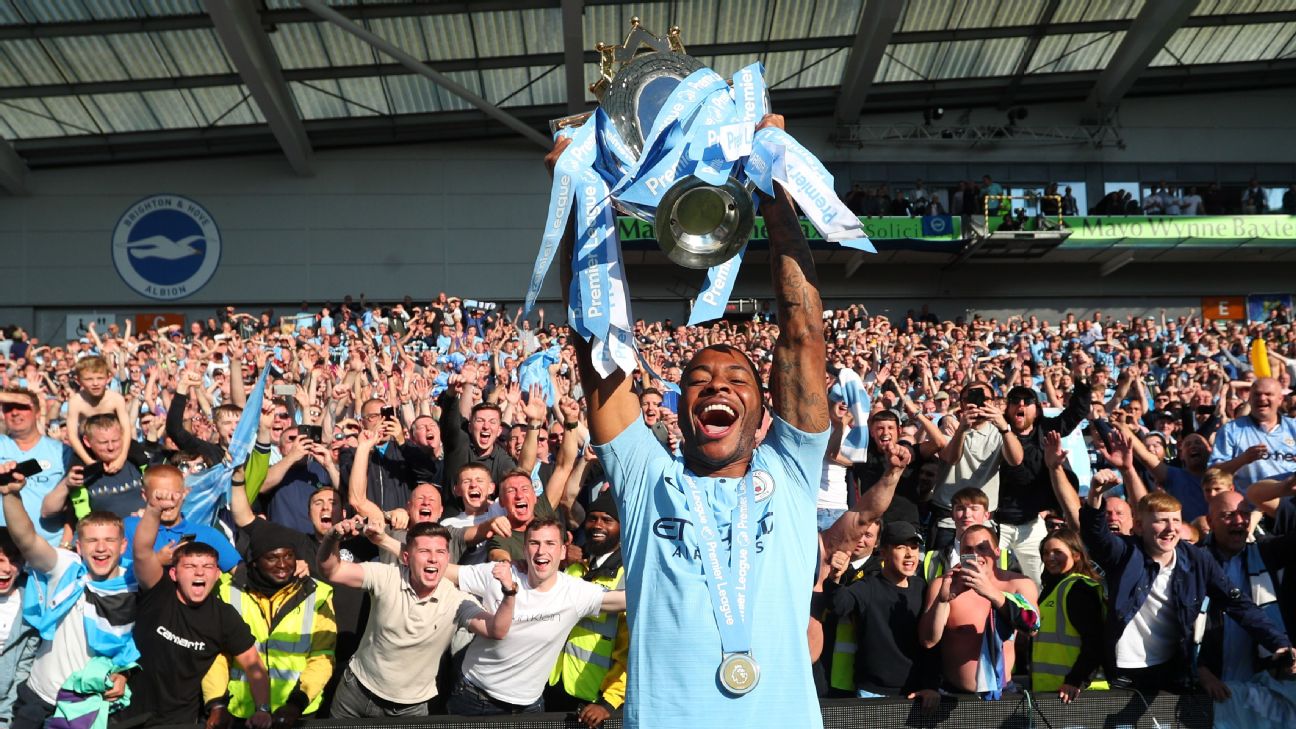
4. Raheem Sterling, Manchester City
It does seem strange that the two City representatives in these rankings finish below the two Liverpool options, but I think the top-five format might undersell just how good City are as a team. If I were making this a top-15 list, it would include Laporte, Fernandinho and Bernardo Silva. Ederson and Leroy Sane probably make it in if it’s a top-30 list. No team — even Liverpool — goes as deep with world-class talent as City.
Sterling finishing fourth as opposed to first is simply a matter of context and preference. He didn’t have to shoulder as much of the load as Hazard, which isn’t Sterling’s fault, but impacts his value. The English international was more productive than Salah on a per-minute basis, but if we’re thinking about this in terms of who generated the most value for his team, Salah staying about as productive as Sterling while playing 309 additional minutes in the league means he brings slightly more to the table. If your criteria are picking the best player on the best team in the league, you could pick Sterling and I wouldn’t bat an eye.
3. Eden Hazard, Chelsea
For the reasons I mentioned above, I think Hazard was probably the most important player in the league to his club. If we’re using actual finishing versus expected finishing, Hazard’s 31 combined goals and assists top the scoring table. Those are two great reasons to place Hazard first. I’d hesitate only because it seems difficult to pick the player of the season from a team that finished 26 points off the pace in the league, even if that had absolutely nothing to do with Hazard’s play.
As you can probably surmise, that leaves us with Salah and Virgil van Dijk for the final two spots. I thought I would try to figure out whether the offense or the defense played a bigger part in Liverpool’s season, but in using standard score to try to contextualize their performance, I found that Liverpool’s offense was 2.0 standard deviations better than the mean. Liverpool’s defense was … 2.0 standard deviations better than the mean. That doesn’t help.
Van Dijk turned around the Liverpool defense when he arrived last January, but he had help this season from a starring left-back in Robertson and a wildly expensive keeper in Alisson. Salah shouldered more of the load with Roberto Firmino missing for a chunk of the season, but he also got to play alongside Mane, who helped finish some of the chances Salah created or passed up. Salah made his attacking teammates better. Van Dijk did the same in the defense. Both had their reputations backed up by advanced metrics.
In the end, with the two relatively equal, I have to resort to positional value. With player of the season awards and transfer fees alike, we’ve generally come to a conclusion that world-class strikers are more valuable than world-class defenders. Van Dijk just sold for £76m, of course, but if Liverpool decided to sell Salah, they would easily get double that figure. (They’re not going to sell Salah.)
If Van Dijk and the defense had been the best in the league by a handful of goals, I’d pick him as the player of the season. Instead, with the two Liverpool stars on a similar tier, I’m breaking my own tie by picking the forward over the defender.
2. Virgil van Dijk, Liverpool
1. Mohamed Salah, Liverpool
